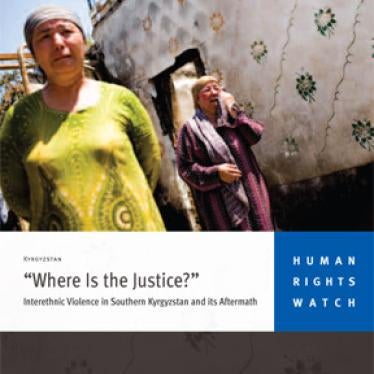(New York) - Kyrgyzstan should act on recommendations in an international report released on May 3, 2011, to investigate systematic ethnic attacks during the June 2010 violence in southern Kyrgyzstan, Human Rights Watch said.
The Kyrgyzstan Inquiry Commission, which investigated the violence and wrote the report, detailed violence by both ethnic Kyrgyz and Uzbeks. It drew particular attention to the systematic and widespread nature of attacks on entire Uzbek neighborhoods, the authorities' loss of control of weapons, and underreported and unacknowledged sexual and gender-based violence.
"This solid, objective, and thorough study details horrific ethnic crimes committed during the 2010 violence," said Ole Solvang, emergencies researcher at Human Rights Watch. "The government should pay careful attention to the commission's findings and carry out its recommendations."
Massive inter-ethnic violence broke out on June 10, 2010, as ethnic Kyrgyz and Uzbeks clashed in the city of Osh and later in other cities in southern Kyrgyzstan, leaving more than 400 people dead, thousands injured and almost 2,000 houses destroyed.
In October, the seven-member international commission began investigating the causes of the violence, the course of events, and the aftermath. It was led by Kimmo Kiljunen, special representative for Central Asia for the Parliamentary Assembly of the Organization for Security and Co-operation in Europe.
In addition to providing a detailed chronology of the events and discussing the social, economic, political, and historical factors contributing to the violence, the report highlights several issues deserving particular attention, Human Rights Watch said.
The findings are based on extensive interviews of some 750 witnesses, 700 documents, nearly 5,000 photographs, and 1,000 video extracts.
The report details crimes against both ethnic Kyrgyz and Uzbeks during the violence. The commission said that attacks on entire Uzbek neighborhoods in Osh city exhibited a distinct pattern for several days. The systematic and widespread nature of these attacks led the commission to say that if the evidence "is proved beyond a reasonable doubt in a court of law, those acts would amount to crimes against humanity."
The commission noted as "particularly disturbing" the ease with which crowds obtained weapons, ammunition, and even armored personnel vehicles from military and police forces. Some members of the security forces were involved in the attacks on the Uzbek neighborhoods, the report said.
The report also said that the authorities generally have not acknowledged or adequately reported sexual and gender-based violence committed during the events. The commission corroborated about 20 incidents of rape and gender-based violence.
The Kyrgyz government welcomed the report but claimed that it was biased in favor of ethnic Uzbeks and disputed that the attacks on Uzbek neighborhoods qualify as crimes against humanity.
Human Rights Watch said that the prosecuting authorities and ultimately a court of law will have to determine, based on evidence of the knowledge and intent of the perpetrators, what classification of crimes occurred. But the systematic nature and seriousness of the crimes, and the need for justice, are not in dispute, Human Rights Watch said.
"All crimes should be investigated and prosecuted because every victim deserves justice, but the systematic nature of the attacks on entire Uzbek neighborhoods made them qualitatively distinct from Uzbek attacks on ethnic Kyrgyz," Solvang said. "No matter how politically difficult it may be for the Kyrgyz authorities to acknowledge this distinction, they need to stop pretending that it doesn't exist."
The Kyrgyz authorities have opened thousands of criminal investigations related to the violence. The commission concluded, however, that the authorities continue to prosecute the Uzbek minority selectively. Ethnic Uzbeks accounted for 75 percent of the casualties and 90 percent of the property losses, but approximately 80 percent of those accused of committing crimes are ethnic Uzbeks. Of 27 people charged with murder, 24 were Uzbek, two were Kyrgyz, and one was not specified according to the commission.
The report also noted that ill-treatment, including torture, against detainees was "almost universal."
In its response to the commission the government acknowledged that human rights violations had occurred and that the police and the courts had failed to ensure respect for and protection of human rights in full and in accordance with the law. The government has said that it will "take all necessary steps to expedite the discovery and investigation of criminal cases, eliminate the discriminatory justice approach, while [concentrating on] cases of torture, sexual violence and the transfer of weapons by the army and police."
"The authorities' one-sided approach to the investigations has only increased tensions between the two ethnic groups and diminished Kyrgyzstan's international standing," Solvang said. "Now the government needs to act responsibly and quickly follow through on its commitments to end these serious human rights violations."







